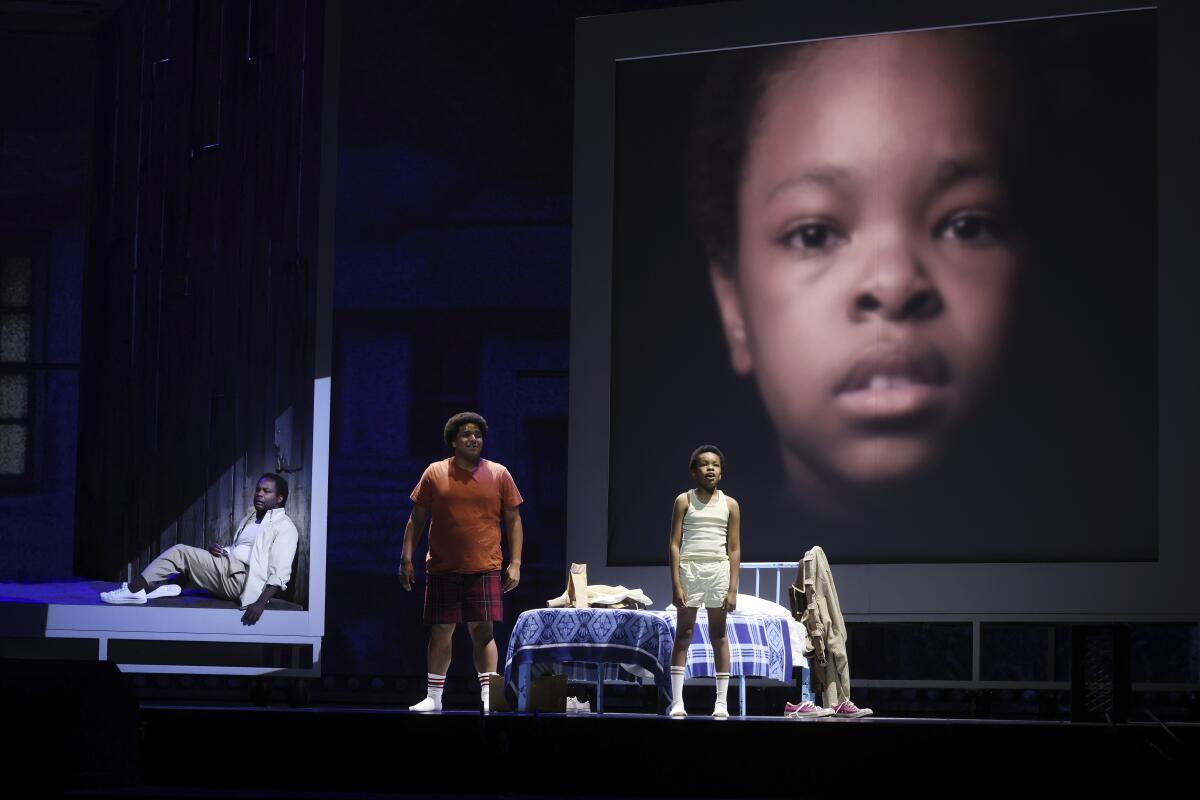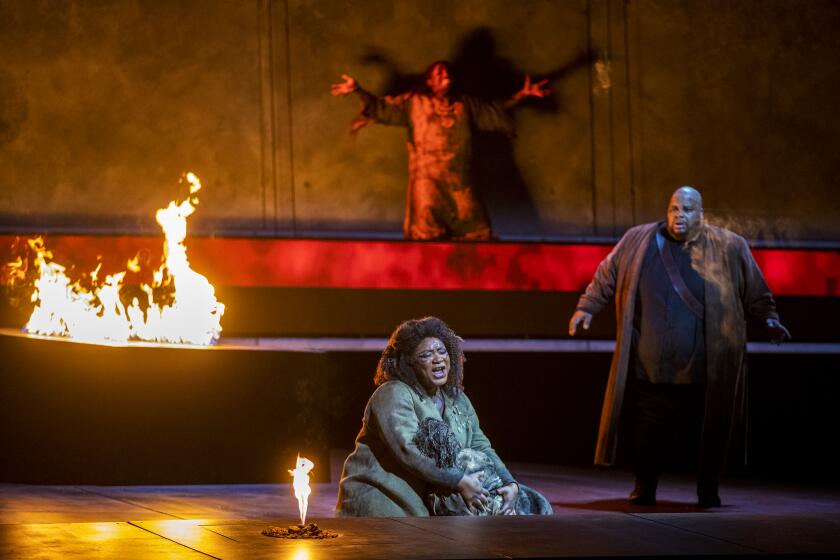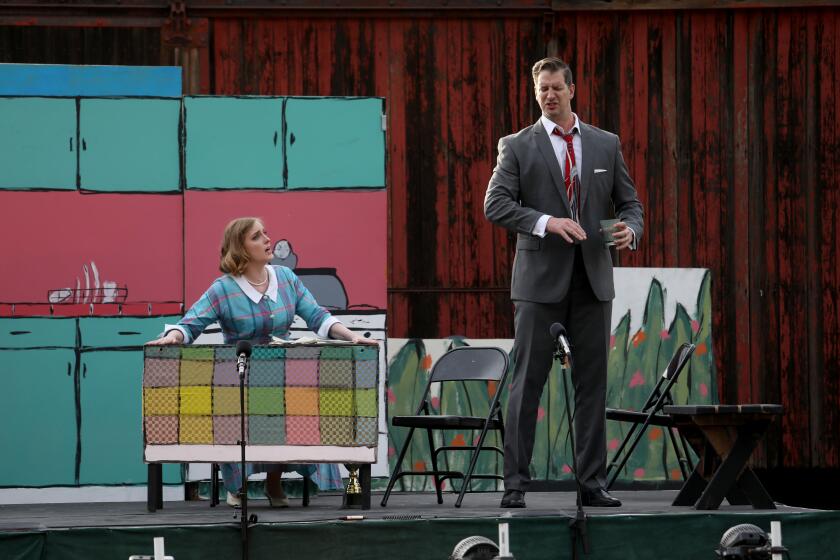Metropolitan Opera returns, with its first-ever work by a Black composer

- Share via
NEW YORK — “We bend, we don’t break. We sway!” sings the chorus in the second act of Terence Blanchard’s “Fire Shut Up in My Bones.”
The words described how much of the audience of about 4,000 at the Metropolitan Opera felt as they watched Monday night’s landmark performance, the first staged work in the house since March 2020 and the first by a Black composer in the history of a company that launched in 1883.
With many of the women wearing evening gowns and jewels and a large percentage of the men in black tie and even a few in white tie, tails and top hats, people celebrated their return to New York’s Lincoln Center after an absence they never imagined.
After an unprecedented gap of 566 days, the country’s largest performing-arts organization resumed staged presentations in a season scheduled to run until June 11. The return attracted a far more diverse audience than usually attends the Met and was simulcast live to video screens in Times Square and Harlem’s Marcus Garvey Park.
There was a minute’s ovation for the orchestra at the start, even before “The Star-Spangled Banner” was sung with many a shimmering high note. And when the opera was over more than three hours later, about nine more minutes of applause rang out for the cast, the composer, librettist Kasi Lemmons, the production team and finally Charles M. Blow, the New York Times opinion columnist whose 2014 memoir was adapted for the opera.
The evening was a triumph for Blanchard, a 59-year-old jazz trumpeter and composer who, like Blow, is from Louisiana. The opera tells a wrenching tale of child molestation in segregated northern Louisiana in the 1970s, and is beautifully composed with nuances of shade and color.
With fresh talent and a quickly built replacement set, L.A. Opera overcomes all manner of obstacles to start its season in the Dorothy Chandler.
“Fire” premiered in 2019 at the Opera Theatre of Saint Louis and was brought to the Met as part of a co-production that will travel to the Lyric Opera of Chicago in March and the Los Angeles Opera in a future season. (The Oct. 23 matinee from the Met, the last of eight performances, will be broadcast to movie theaters around the world.)
This is Blanchard’s second opera after 2013′s “Champion,” about boxer Emile Griffith, and the music is most colorful and moving in orchestral parts. At times, the vocal writing can seem more restrained, especially in the first act. Energy lifts at the start of the second act, set in a Baptist church, with “Wash Me Clean” and Blow’s recollection of a storm from his youth.
There seems to be an allusion in the text to the “Liebesnacht” from Wagner’s “Tristan und Isolde,” a duet between Charles and girlfriend Greta proclaiming, “I used to hate the night. Night was my sworn enemy.” And picking up on the search for sexual identity, a theme from Blow’s book, Charles sings near the end, “I am what I am,” harking back to “La Cage aux Folles,” the 1984 Tony Award winner by Jerry Herman and Harvey Fierstein.
Blanchard and Lemmons condense a largely descriptive book to key moments in Blow’s memoir: growing up the youngest of five children, the assault by a cousin named Chester, Blow’s baptism, a brutal hazing by a Grambling State University fraternity and the search for love, first with Evelyn and later with Greta. The audience’s biggest response was for the dancing fraternity brothers, who stopped the show.
Pacific Opera Project’s production of Leonard Bernstein’s ‘Trouble in Tahiti’ is the city’s first major live opera show that’s not a drive-in event.
Blanchard and Lemmons move the plot along by having the adult Charles (imposing baritone Will Liverman) sing alongside the young Charles, known as Char’es-Baby. Walter Russell III, a 13-year-old who played the young Charles, got the biggest individual cheers with a star-making performance that was charming, insightful and moving.
An all-Black cast included soprano Latonia Moore as Charles’ doting mother, Billie; soprano Angel Blue in the endearing triple roles of Destiny, Loneliness and Greta; and bass-baritone Ryan Speedo Green as the menacing Uncle Paul.
Music director Yannick Nézet-Séguin — wearing a colorful shirt markedly different from the attire of his predecessor, the late James Levine — and chorus master Donald Palumbo brought out a vibrant performance. Nézet-Séguin, showing a commitment to contemporary work seldom seen at the Met, is to lead Matthew Aucoin’s “Eurydice” in November.
Directors James Robinson and Camille A. Brown (she was also the choreographer) blocked a breezy production with sets by Allen Moyer that were dominated by two large squares that shifted on and off stage.
More to Read
The biggest entertainment stories
Get our big stories about Hollywood, film, television, music, arts, culture and more right in your inbox as soon as they publish.
You may occasionally receive promotional content from the Los Angeles Times.











